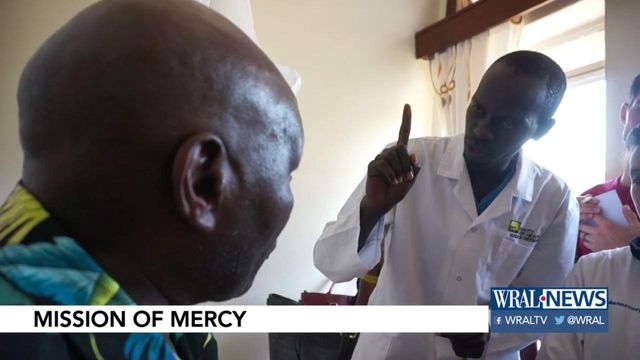Duke University team looks to train Ugandans to be self reliant
A big part of the effort behind the travel to Africa by the Duke team is to ensure that the Ugandan residents are able to continue providing healthcare once the American medical professionals have returned home.
Posted — UpdatedWhen the American medical team from Duke University and Stanford first arrived at Mengo Hospital in Uganda, some of the local staff members, including operating room nurses, were hesitant to participate in surgeries with them.
A big part of the effort behind the travel to Africa by the Duke team is to ensure that the Ugandan residents are able to continue providing healthcare once the American medical professionals have returned home.
Jana Hale, a nurse from Stanford University Medical Center, recalls one Ugandan nurse who was quiet and reserved.
“She was very timid and just stayed in the corner and didn't want to get involved,” Hale said.
By the end of the week, however, the Ugandan staff had grown very comfortable handling neurosurgeries.
“By the third day, (the nurse) did surgery by herself,” Hale recalls.
Rachel Musasizi, a Ugandan biomedical engineer, said meeting the team from Duke has helped her grow.
“I’ve really learned a lot from them,” she said. “And we have also shared knowledge (about the) various (pieces of) equipment.”
Carol Kizza, who is the head Ugandan operating room nurse praised the Americans and their embrace of the African medical team.
“We’ve learned a lot from (them) because of (their) teamwork,” she said.
The Americans also learned a thing or two.
“Coming here, you have to step out of your comfort zone,” said Eva McCann, a certified registered nurse anesthetist. “And man have I stepped out of my comfort zone. But it’s been an awesome experience. I really enjoy and love the Ugandan people.”
“I don’t think I was expecting what I was going to get,” said Jen Massengille, a nurse from Duke. “They taught me more than I could ever teach them.”
Bobby Gramer, a Duke medical student, agrees.
“The local people have ways of getting around shortcomings (and) lack of resources that you would never ever think of in the U.S.,” he said.
Dr. Michael Haglund, a neurosurgeon from Duke created the program where he and a medical team from the Triangle travel to Uganda to perform life-saving medical procedures. “
“They don’t have any operating microscopes, so we brought two operating microscopes.”
Another important way the Americans work to make the program sustainable is to leave surplus medical equipment from Duke in Uganda, allowing African medical personnel to continue performing medical procedures.
“We’re leaving them with what is a 2015 operating room in the United States,” he said. “They can still do some of the surgeries even if we don’t get done with the ones” on our schedule.
Mengo Hospital Director Dr. Rose Mutumba is confident the program will thrive.
“Right from the word go, it’s been structured in a way that’s going to make it sustainable,” Mutumba said. “Even when the team from Duke University leaves, we have our own local neurosurgeons who can continue.”
Neurosurgeons like Dr. Oscar Obiga, who was one of the first Ugandan doctors to be educated and trained through the Duke program, said he is committed to staying in his native country and continuing this work.
“It makes you feel very valuable in the country,” Obiga said. “It makes you feel like what would happen to the people if you left.”
For the American team, the trip to Africa is an experience they will never forget.
“For us, it’s a recharge,” said Dr. Jerry Grant, a pediatric neurosurgeon from Stanford. “We feel really refreshed about what we can do at home and how lucky we are with all the resources we have.”
The Uganda residents say they are grateful for what the Americans have done.
“We thank the team of doctors for coming to Uganda and (performing) these surgeries (for) the dear fellow Ugandans,” said Zaitun Ferouz, who is related to one of the Africans who underwent a medical procedure.
“We are very happy because we have been waiting for you all these days,” said Amina Marsal, the wife of a patient who received medical care.
“It’s a miracle,” said Florence Nsubuga. “It’s a miracle for my family.”
For everyone at Duke who is involved in the program, it’s hard to put into words what it has meant to them although they use works like transforming and life changing.
All involved say they will return to Uganda.
• Credits
Copyright 2024 by Capitol Broadcasting Company. All rights reserved. This material may not be published, broadcast, rewritten or redistributed.






